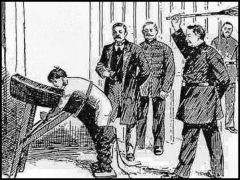Donald MacLean's Blog 9
HABIT
Last month's blog (Copyright) was very general ... this month's is so personal that I have repeatedly avoided writing it.
This is the best time of day. I have fed the dog, made our porridge, eaten mine, we have walked in the woods, I have shaved, showered, swallowed 6 pills, drunk 1 pint of water (hate the stuff) and now I sink into an armchair with a large cup of Darjeeling, a (wheat-free) choc-chip cookie, and the Financial Times. Best time of the day.
Habit.
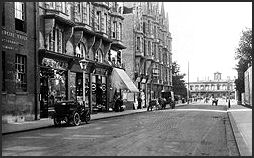 |
I am walking along the High Street in wartime
Reading, Berkshire, on a Sunday morning. In my late teens.
My khaki uniform is new and scratchy (it replaced my Air Force one).
I'm hoping that people will notice that the badges are of the new technical
corps REME.
Suddenly I feel ill. And very frightened. I'm going unconscious. Dying. My breathing is rapid ... heart racing ... muscles over which I have no control are contracting in fearful waves up my spine. I seek refuge in a public loo and eventually, in a nightmare, get myself back to barracks. Alive. Very scared.
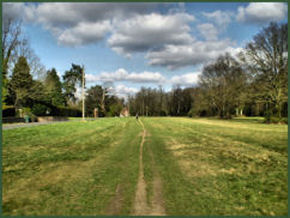 |
Fifty years later I get the dogs out of the car and set off for our regular
walk. In a wide circle. Keeping the car in sight ... in case I
need to get to safety. The mysterious illness strikes less often now
that I'm retired. But after half a century of it these defence measures
are automatic.
Habit.
Panic attacks are themselves a habit ... a bad habit acquired, unwittingly, by rather a lot of people - now that it's OK to talk about it. (The NHS quotes "at least 1 person in 10 experiences them occasionally, 1 in 100 suffer them repeatedly".) Back in 1944 it was not OK to talk about it. For a start it had no name. When I described the symptoms to the Medical Officer he told me to pull myself together. I tried ... very hard. Which made it worse.
Sixty-five years later I venture deep into the woods every morning - and again every evening. I walk with a stick, sometimes hobble - but am relaxed and happy. What made the difference? I'll tell you in a moment. It may surprise you.
If we think about it, many of our actions during the course of a day - indeed most of our actions - do not involve conscious thought? We've done these things before - often enough for them to have become habitual.
Habit.
Learning to drive a car requires our full attention ... but after doing it for years we drive with our minds mostly engaged on other matters. Vehicles, traffic signals, weather conditions all receive adequate attention - but few of the car-driving actions involve much of our minds - they're habitual.
Habit tends to get a bad press. But it's an important - a beneficial - part of our life. Without our habits we'd get little done.
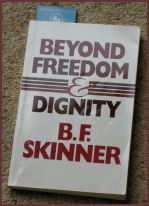 |
I have mentioned elsewhere that when I was demobbed from the army and we had the option to go to university for free I studied psychology. (I didn't graduate that time ... a BBC job offer was too tempting.) What interested me was 'behavioural' psychology - then new, revolutionary - the practical business of what motivates us to do things, to become 'the sort of person' we each are.
Ann and I have a friend whose spiritual healing of sick animals, including ours, has been effective (proving that 'placebo effect' is not involved?). Lisa is a psychology graduate. When I told her my hero had been B.F. Skinner she politely but firmly placed him among the has-been theorists.
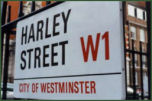 |
During a Panic Attack my body behaves as if I was being attacked by a tiger - it has received the message "Run like hell!" But there's nowhere to run to ... there's no tiger ... it's irrational - which makes it worse. Over the years I asked a succession of psychiatrists where this message was coming from and how I could switch it off. None could tell me. They all prescribed the latest tranquilizer. A phial of Librium was my constant companion for almost 20 years. (Incidentally I took them daily - and stopped taking them suddenly, no gradual phase-out, without the slightest ill-effect - I was lucky.)
Habit.
The tiger was most likely to pounce when I was under no pressure. Sitting in a train with my young son Colin (to go somewhere we wanted to explore) I grew more and more fearful - the train had no corridor - no escape route. As the Guard's whistle blew I had to grab his hand and disembark.
I hated failing him.
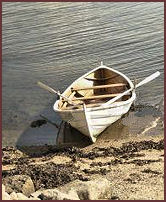 |
Habit.
I told him about my boyhood hours spent in boats on the lochs of Scotland - then, walking down the shore to embark, the tiger's whiskers brushed my neck and I had to turn round.
I hated failing him.
Habit.
Crouching in a doorway in busy Hampstead High Street praying for a taxi to come by to take me the few hundred yards back home.
I hated failing myself.
Habit.
Those are the sort of experiences
that etch themselves into the memory of those of us who have caught the habit of panic.
 |
|
My friend Peter in his plane. (This is his ham radio card - AA7E) Who's jealous? |
A private pilot has to have an annual 'medical' to renew his licence. Our doctor had become a friend ... he was, after all, finding me a new shrink every couple of years ... and on one of my licence-renewal visits he asked the very sensible question "What if you were to panic one day when you're coming in to land?" I had no hesitation in saying "No chance ... when my mind is fully engaged the tiger doesn't get a look-in."
A TV Director on "Outside Broadcasts" in my day did the vision-mixing himself (switching between cameras) - when broadcasting unpredictable events there could be no detailed pre-planning of shots. You watched a row of screens, fingers pressing buttons, moving faders, in your left earpiece the voice of an assistant (warning that the subject of the next sequence had not appeared), in your right ear the senior engineer (warning that an upcoming shot was technically unacceptable). What the viewer was hearing came out of a loudspeaker somewhere and got what was left of your attention. A panic attack now would have created a million or two blank TV sets - and the next morning's headlines. It never happened ... I knew it wouldn't.
Hopefully very few of my colleagues and friends knew about my tiger. But he certainly qualifies as one of the threads that run through most of my life.
What finally freed me from him? My mobile phone. And Ann's. The knowledge that if he pounced I had an instant lifeline to someone who understood. (Someone special who happens to be not just a Cordon Bleu-trained cook but an experienced Samaritan.)
Having a lifeline I never need it.
Habit.
I had long ago promised a New York publisher first option on my memoirs if I ever wrote them. I've always been absent-minded - my memory is notoriously unreliable - so I did not expect to have to fulfil this promise.
Then, when I retired, 23 years ago, I dumped some memories into my computer and was surprised to find that recollecting an event, and recording it, triggered others. And so on.
I should have known: Long-term and short-term memory are two distinct faculties. In my case the former turns out to be formidable (whether accurate may be another matter) ... and the latter poor, and worsening.
This process of recollection produced a surprising twist to the story of my bad habit of panicking:
We spent the summer of 1939 in a croft in the remote Highlands of Scotland. I was now a teenager. On the morning of Sunday 3rd September I sat beside my father in his car. Under the dash a large American radio hummed importantly. The cobwebby voice of Prime Minister Chamberlain said "... and so this country is at war with Germany."
Everyone expected German bombers to attack our cities in short order - "blitzkrieg" had succeeded in country after country. So it was arranged that we children would stay on and attend the village school.
 |
|
The old schoolhouse (It's now a B&B) |
West Highland communities were strictly polarised - Catholics had a large modern school - there was, of course, no Quaker one and the Protestant school was a single room with a single teacher. My sister Deirdre (5) sat in the front row, brother Nigel (11) much further back - Chrissie Macdonald (13) and I sat in the back row. She and I were given Walter Scott's "Lady of the Lake" to read, while Miss Duncan's attention was given in an ascending scale to the younger pupils.
Chrissie passed me a note - "Today I've got the curse ... do
you know about that?"
I was learning much more from her than from
Miss Duncan.
The daily journey to school was 2 miles each way. Deirdre travelled on a pillion seat fitted to the back of my bicycle by the village blacksmith. The first part of the journey was twisty and uphill - a drudge in the morning but an exciting helter-skelter in the afternoon!
Our parents decided to return to Glasgow to put the house on a war footing (netting on windows, and in the basement heavy wooden ceiling-supports and bunks). My father gripped my shoulders and said "Now for a wee while you are head of this household", and the Humber and Wolseley set off Southward.
With puberty recently behind me, I took his remark seriously. Younger sister Fiona's second birthday was imminent. I doubted that her upmarket Nanny would consider herself or her charge as being in my care, but I was devoted to this little girl. An important part of the exciting new adult responsibility would be to protect her.
That was a typically kind gesture from my father - he knew how much his words would mean to me. (Had he known what lay only days ahead, his words ... our parents' actions ... would have been very different!)
The following week we arrived home from school one day to find the croft empty ... on the kitchen table a note from Nanny: "Fiona isn't well - I'm taking her to hospital."
Just days later a village boy parked his cycle at the door and handed me a telegram. From Dad. "Dearest D, N and D ... I'm so very sorry to tell you this. Fiona had meningitis. She has died."
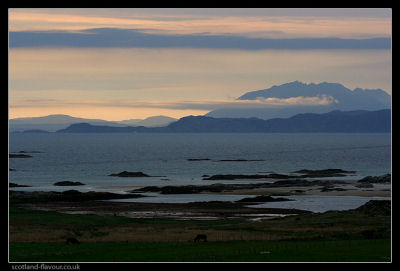 |
|
The far Cuillins |
It's seventy years since that moment and throughout that time the ensuing two or three weeks have been a horrible blank. Presumably a standard trauma. I remember only endless, sleepless, nights, gazing out of the dormer window of my room, the sky often a shimmering curtain of Aurora Borealis over the ocean and the isles of the inner Hebrides. I thought I had become insane - latterly that I was hallucinating. The dearest little person in the world had been in my care - and somehow - I'd no idea how - I had failed her. It was utterly irrational but I was overwhelmed with guilt.
Two years later I spent part of the summer at the holiday home of my school chum Ian Boyd, whose parents were both doctors. One evening, out of the blue, Ian's mother said "How is that beautiful baby sister of yours ... she must be getting quite big now?" I stumbled out of the room in tears. Poor lady. I suspect this might have been my reaction had this happened at any point in my long life. Losing my father, my mother, my wife of 34 years, were trenchantly painful experiences - but maybe I was strengthened for them by a little girl who was, so briefly, my sister ... my protégée.
It seemed reasonable to assume that my panic attacks (particularly the physical aspect: the spasm of involuntary muscles running up my spine to my head) were a 'sympathetic reaction' to Fiona's dying of meningitis (inflammation of the spine and brain - incurable then). That is the belief which I have held throughout the years.
But something odd has happened.
Having found I could recall many aspects of my life, and beginning to record them, I woke up one morning picturing a large empty room occupied by two strangers ... I was dressed only in one long garment ... I was frightened. I assumed this must be the memory of one of those occasions when I've had to walk into an operating theatre in a hospital gown. But this was a coarse material - a military greatcoat!
It felt not at all like a dream - just a normal memory of a significant event. But for the life of me I couldn't put it in context. It haunted me for much of that day ... then faded.
Months later I had a restless night - I woke about 3am with another 'non-dream' in my mind - I was looking at a lonely house whose conservatory had collapsed ... wicker furniture stood like islands in a sea of shattered glass and broken timbers ... devastation ... which I had caused! I was overwhelmed with guilt. The dreadful feeling I'd had when Fiona died.
Once again the context of this 'memory' was out of reach. I went to my laptop and described the two events. And as I recorded them I began to wonder - could these possibly be memories from my 'empty' weeks in 1939?
Wide awake now I composed a message to an email-friend in Scotland. Liz is a professional researcher for TV & films. I attached my file notes, and asked her if she ever went to that part of the Highlands.
It was a while before she answered (she'd been working abroad). She was intrigued ... would do a little detective work next time she was there.
Again many months passed before her next missive. We exchanged brief emails:
Liz: I reckon your memories came to you the wrong way round. You got pissed, trashed someone's conservatory, and received the standard remedy of the day - six of the best.
Me: Thanks, Liz. You've been working on too many dramas.
Almost a year then passed. I'd given up hope of hearing from my private detective when a terse email arrived ... "Still on the case. Will be there briefly next week. Stay tooned."
And shortly thereafter: "Pre-war Court building demolished lang syne, but I had sight of some records. Nothing relevant. In fact nothing. Suspect admin gap at outbreak of war - clerks gone to army? Am pursuing a less formal avenue - don't ask."
A week later: "How's this? Nov 1939 - on a Tuesday afternoon the Procurator Fiscal interviewed a youth who had admitted causing criminal damage to property. Remanded. And on the Thursday of the following week, at 4.30pm. a Police Sergeant administered 12 strokes of the cane to an un-named youth."
Wow. A Google on "Corporal Punishment, Scotland" produced the information that boys up to 17 were routinely "birched" until 1948. It had to be done on the day of sentence and in the presence of a doctor. There was a picture from the museum of a Highland town showing a sort of table on which the victims were secured.
I asked Liz if it was possible she would find a name. No answer. I emailed again ... the message bounced (unknown at that address). And that's the last I've heard from her.
So. The timing fits. But it's hardly conclusive evidence.
I had the bright idea (as it seemed to me) of writing my next short story on this basis ... that would surely trigger the remaining memories.
I wrote it. It didn't. I'm no forarder.
Here's a synopsis of the story:
One evening shortly after the death of my sister I cycle Northward on the desolate road. Pedalling frantically. Not because I want to get anywhere ... in anger and frustration I cannot think of anything else to do. Eventually I stop at a lone villa - the driveway lined with white rocks.
To my horror I realise I had thrown one of the rocks at the conservatory. (This was completely out of character ... when my friends had thought it fun to transplant a neighbour's large sun-brolly to the top of an apple tree I had hidden in embarrassment.) The rock had hit the main beam which must have been rotten ... the whole edifice has collapsed ... wicker chairs sit like islands in a sea of shattered glass and broken timbers. No-one appears.
The irrational guilt which had overwhelmed me is now joined by real guilt. I cycle to the Police House and confess.
The next day, after school, our GP collects me and we drive the 35 miles to the County Court. The Magistrate/Judge in Scotland is called 'Procurator Fiscal' - he is sympathetic - but leaves me in no doubt that I am in deep trouble. "Have you ever had a good hiding? No? I fear you have some new experiences ahead."
There follow nine tortuous days of waiting - long sleepless nights - before the second 45 minute drive to the County town.
I have to wait in a general office ... kindly ladies trying to cope with the work left by male colleagues gone to join their regiments. The Procurator is still friendly - he introduces me to a Dr Gilmore and a police sergeant, and I have to sign a ledger, alongside the words "Cane - 12 strokes." He shakes my hand, repeats his condolences, hopes we might meet again in happier circumstances.
In a basement room I am given a Civil Defence greatcoat - many sizes too big - and told to leave my clothes on a chair in
the corner. Face down over a table my ankles are buckled, and as my wrists are being fastened I realise I am being deprived of all control (memories of a childhood op and the terrifying paralysis of a crude anaesthetic.) My breathing is rapid ... heart racing ... muscles over which I have no control are contracting in fearful waves up my spine.
When the sentence has been carried-out the greatcoat is draped round my shoulders and I am told I'd taken it well. I don't think so. Back in the office the ladies, thankfully, have left for the day. The guilt which had overwhelmed me is gone. I can grieve normally, like the rest of the family.
I prayed that my family and friends should never know of this ... and I believed that they didn't. Now that I think about it, however, I realise that my parents must have been consulted - one reason for the 9 days delay. Poor souls, they didn't need this addition to their anguish. And it was typically sensitive of them not to confront me with it.
So ... those flashbacks ... were they of hallucinations? Or of reality?
Did I acquire the bad habit of panic attacks in the attic of a Highland croft or in the basement of a Courthouse?
During tortuous nights, or at 4.30pm one November Thursday?
I don't know - and that doesn't matter.
What matters is the fullness of the life that I've enjoyed despite the tigers ... the love that I've given and received so fully.
And the pleasant fact that my most satisfying habit today is represented by the large cup of Darjeeling that's now cool enough to enjoy.
This is the best time of day.
D.H.M.
Fyodor Dostoevsky.
- - - - - -
Back to 'Contents' table
- - - - - -
Photo of the old schoolhouse kindly taken for me by Neil MacLean
Photo of the Cuillins of Skye by kind permission of Carmen Mardiros.
Her evocative images are at the aptly-named www.scotland-flavour.co.uk
- - - - - -
Panic
: "A sudden overwhelming feeling of terror. Peace: "A state of serenity."HOW TO TURN PANIC INTO PEACE
If you came face to face with a tiger your
body would instantly change gear - an adrenaline rush, fast breathing, fast
thinking - maximizing your ability to escape. This happens automatically
- you don’t have to turn on this state of mind and body, hundreds of
involuntary muscles do it for you.
But there’s no tiger. Your body has
accidentally created a state that is just as inappropriate as if you’d faced a
real tiger with a laid-back, relaxed response! And because your response is
involuntary you cannot "pull yourself together" - these muscles do not respond
to your direct commands in the way your arms and legs do. And because you are
an intelligent person you know that you are behaving irrationally, which
compounds the problem.
There may or may not be benefit in
discovering why this accident happened in the first place. Either way, this
note spends no time on analysis. We focus wholly on the practical matter -
how to stop the rising tide of panic and feel a growing serenity. Here’s
how:
1. Smile. Never mind if people can see you. Smile. From ear to ear.
2. Sit down. Right back in an easy chair. For all the world as if you were relaxed!
3. Clench your fists. Hard. Then lay them open, palms up. Let all the tension ebb away.
4. Tense both feet. Hard. Toes curled. Then let all the tension ebb away. Forget them.
5. Smile still beaming? (You are sending a powerful message to your involuntary system.)
6. Tense both lower legs. Ankles, calves. Hard. Let the tension ebb away. Forget them.
7. Tense thighs and buttocks. Hard. Then let go. Forget them.
8. Tense tummy muscles. Hard. Then let go. Forget them.
9. Tense shoulders, neck, arms. Hard. Then let go. Forget them.
10. Stop smiling. Frown. Tense all facial
muscles, eyes. Then let go. Smile. Back to 3.
Do this frequently. So often that relaxing
becomes a habit.
In between times - smile. Smile so often
that it becomes a habit.
You will soon begin to feel better. Your
sub-conscious will increasingly relinquish its bad habits as your
good habits get stronger and stronger.
You’ll wake up one morning and realise that
it’s been days since the tiger visited. Then weeks. Exploit this growing
freedom gradually. There will be down days. Smile at them!
Gradually start looking outwards. What can
you do for other people?
To qualify as a really expert panicker you must have an active imagination, care about what others think of you, be unwilling to do less than your best. You are, in short, a rather special person. When the tigers are purring at your feet, enjoy putting all this talent to work. With a smile.
Donald MacLean. Chiltern Self-Help Group. March 1999.
- - - - - -
If you suffer from Panic Attacks there is help on the internet ... click here
- - - - - -
Back to 'Contents' table
On to Blog 10
- - - - - -

